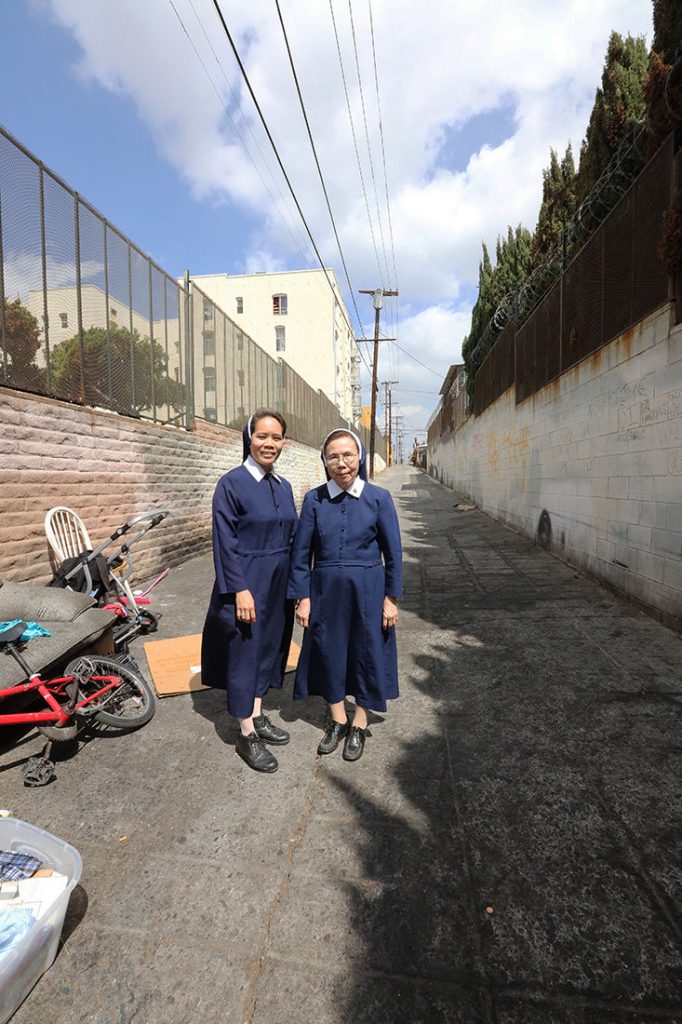At an age when most women are enjoying retirement, many are finding themselves unemployed and forced to live on the streets or in shelters.
While charities in Los Angeles seek out the homeless, Adriana Sandoval, the director of development at Good Shepherd Center, says these elderly women are a “forgotten group.” Many people are familiar with the idea that single moms, the mentally ill and the emotionally abused are homeless, but charities are witnessing a new growing concern. More and more elderly women are finding themselves unemployed and on the streets.
“It’s a phenomenon we are seeing in the entire area,” says Tom Wukawitz, the program manager at Good Shepherd Center. “Several of the other providers that I’ve talked to over the course of the last four or five months have also seen that increase.”
He adds, “It has been a marked increase. At first, I thought it was an aberration, just a spike. But it’s steady. It hasn’t dropped.”
Many of these women, Wukawitz explains, came from a generation where the wife was the homemaker and the husband went to work. With the death or loss of a spouse, many women are faced with an economic disaster.
Although many of the women are eager and excited to join the workforce, finding employment can be tough, Wukawitz says. Many are seen as too old by prospective employers, many don’t understand computers or newer software and many are “women of color,” adding to the prejudice against them.
Good Shepherd Center provides temporary housing to women while helping them find work and long-term housing. At the moment, about 93 women and 43 children benefit from the center’s many housing programs, which include Hawkes Transitional Residence, Farley House and Languille Emergency Center.
Case managers at the center collaborate with about 15 to 20 providers, looking for subsidized housing, shared housing or low rate market rentals for the women.
One woman was 76 years old when she found herself homeless. She wasn’t able to work because of her old age, but her doctors wouldn’t give her a disability diagnosis because they said she was simply experiencing the aging process. With the help of her small Social Security pension and food stamps, the woman was able to live on her own in a rent-subsidized studio.
Wukawitz says he started tracking the increase in elderly homelessness in July. Prior to that, he remembers maybe four or five elderly women at the Languille Emergency Center. But by September, that number had increased to about 15, with the same kinds of numbers at the other two Good Shepherd centers. “And it hasn’t slowed,” he says. “They are about 50 percent of our residents.”
Sandoval notes that the holiday season is usually the time when people feel drawn to volunteer, give gifts to the disadvantaged and write checks for charities, but the rest of the year, people can forget to be generous. “We are usually pretty blessed around the holidays,” she says. “It’s usually the other days where they kind of forget that we are here.”
General operating costs take a large toll on the center, says Sandoval.
“Homelessness never takes a break, especially here in Los Angeles.” Volunteers are always needed, but those willing to make a monetary contribution benefit the organization in a special way, because they fund caseworkers who train the women in how to write a resumé, dress for an interview and ultimately succeed at becoming independent.
Sandoval invites interested donors and volunteers to visit the center. “Once people see the center, they totally fall in love with it. And it’s totally not what you expect when you think about a homeless shelter. Our premises are very well kept. They are beautiful. They are clean. … I always come back to our mission statement that mentions dignity and love, and I think it really shows in how we treat our clients.”
To make a donation or to learn more about Good Shepherd Center, please visit gschomeless.org or call (213) 482-1834.

